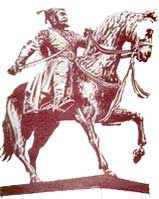Maratha King Chhatrapati Shivaji Maharaj


Shivaji Maharaj, also known as Chhatrapati Shivaji, was born on February 19, 1630, in the hill fort of Shivneri in Maharashtra. His father, Shahaji Bhosale, was a Maratha general, and his mother, Jijabai, played a significant role in shaping Shivaji's character. From a young age, Shivaji was instilled with the ideals of justice, leadership, and Swaraj (self-rule), which he carried with him throughout his life. Shivaji’s journey toward establishing the Maratha Empire began with the capture of Torna Fort in 1645, when he was just 16 years old. Using innovative military tactics such as guerrilla warfare, he expanded his kingdom by capturing several forts and territories. His strategic genius allowed him to challenge much larger and more powerful enemies, including the Mughals. Shivaji’s rise brought him into direct conflict with the Mughal Emperor, Aurangzeb. In 1666, Shivaji was invited to the Mughal court in Agra, where he was placed under house arrest. His daring escape from Agra remains one of the most legendary episodes of his life. After his return to Maharashtra, Shivaji continued to expand his kingdom and resist Mughal advances, establishing the Maratha Empire as a significant force in India. Shivaji was not just a warrior; he was also a visionary leader and administrator. He established a council of eight ministers, known as the Ashta Pradhan, to help manage his kingdom efficiently. Shivaji was known for his policies promoting justice, religious tolerance, and the welfare of his subjects, regardless of their caste or religion. His naval prowess also protected India's western coast from foreign invasions. Shivaji Maharaj passed away on April 3, 1680, but his legacy lives on. He is remembered as a symbol of courage, justice, and resistance against foreign rule. His vision of Swaraj and his progressive administration have left a lasting mark on Indian history, inspiring future generations of leaders. Today, he is celebrated as one of India's greatest rulers and an icon of Maratha pride.Shivaji Maharaj: The Visionary Leader of India
Early Life and Upbringing
Rise to Power
Conflict with the Mughals
Governance and Administration
Legacy
Chhatrapati Shivaji Maharaj born in the hill fort of Shivneri.
Chhatrapati Shivaji Maharaj's overran the hill forts of Kondana, Torana and Raigarh.
Chhatrapati Shivaji Maharaj's Guardian Dadaji Khondev died..
Chhatrapati Shivaji Maharaj conquered Javli from Chandra Rao More.
Chhatrapati Shivaji Maharaj came into conflict with the Moghuls for the first time by making raids into Ahmednagar.
Afzal Khan of Bijapur was killed by Chhatrapati Shivaji Maharaj.
Chhatrapati Shivaji Maharaj made an attack on Shaistakhan's camp and wounded him.
Chhatrapati Shivaji Maharaj escaped from Agra.
Chhatrapati Shivaji Maharaj crowned himself at Raighad and assumed the title of Maharaja Chhatrapati.
Chhatrapati Shivaji Maharaj s last campaign against Jijapuri Karnataka. Captured Jinji and Vellore.
Chhatrapati Shivaji Maharaj died.
.
Mumbai has Best & Largest Rail Network in India.
Its a Financial Capital.
Fashion Street to Buy Latest Designed Clothes.
Its Famous for Vadapav which you can get everywhere all over Mumbai
National Park at Borivali to Relax
Play Cricket, Foot ball and also a Great Green Cover at Five Gardens at Wadala
Amazing and Safe Night Life
Bollywood, Most Films Actors live in Mumbai.
Ganpati, Eid, Christmas Festivals etc are celebrated with Fan-fare
Juhu Beach, Gateway of India, Shivaji Park are Best Locations to Go during Weekends and Holidays
In This Section we have covered Tips section with cooking tips, health tips, educational tips, Photography Tips, Stain Removing tips, Computer Tips, Dandruff Removal tips for Better Life